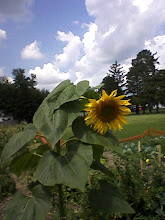You may have heard that one billion people are literally starving to death right at this moment. That is one in six people on the planet. The U.N. announced this statistic recently. The link is to an article by Fr. John Dear, who is coming to speak at ODU tomorrow.
We have all known for decades the enormity of global poverty, disease and hunger. As theologian Sallie McFague points out, that knowledge practically defines our modern era. Never before have people lived their entire lives knowing that an enormous amount of people are not just suffering, but actually starving to death. Even if you don't actively think about it, it is always there in the back of your consciousness.
People growing up in isolated villages in the Middle Ages, for example, knew their own suffering but had no idea what it was like on a global scale. If all was well in their village, they could rest knowing that had done their share. We never get that rest. Their saints were theologians. Our saints are humanitarians.
One of the things I remember the most from my childhood are those statistics that relief agencies spout out about how many tens of thousands of people die each minute, each second, each day. They haunted me then, they haunt me now.
We live in the Age of Information, and the information is grim. We don't talk about it much, but to think that it doesn't somehow affect us, that this information doesn't eat away at us and keep us awake at night, that is doesn't sit in our cells and cause cancers in our bodies, is probably mistaken. Jesus reminds us that we are one family on earth. If you stub your toe, the whole body aches, no matter how good your distractions are.
I see one billion people starving everywhere. It is changing the way I look at everything:
When I see people spending thousands of dollars redecorating their home and buying antiques, all I see are one billion people starving.
When I see people playing basketball in the park, I see one billion starving.
And yes, even when many beautiful things happen through the ministries of The Catholic Worker, I see one billion people starving. While there is no way to know exactly how God works, there are many times when I lie awake at night and realize that no one's going to live or die based on our ministries. God does work in mysterious ways, and it is possible that someone we help nurture through a retreat, or give food to through our pantry or teach in our ESL will somehow take that seed and sprout it into all sorts of good humanitarian work. But why must we hope for the Hail Mary pass, so to speak?
How can any of us justify doing any of the above activities knowing that one billion people are literally starving to death? I'm not trying to lay down a guilt trip on anyone, this is just a purely matter of fact, logical question. I don't understand why everyone on earth doesn't just stop what we are doing and attend to this like NOW. Maybe the collective shock of this information hasn't really hit home, yet.
If your mother were literally starving to death, you wouldn't go on retreat to "discern" whether you were "called" to help her. You wouldn't sip coffee with your pinky in the air and talk about it over polite banter with your friends. You would move hell and earth to get to her. You would break every speed limit to get to her in time. Jesus tells us to think of all human beings in the same way we regard our own flesh and blood family members and to have that same instinctive response to intervene when they are suffering.
I'm not suggesting that we give up all entertainment. I'm not saying we should give up helping others in our locale. I'm not suggesting we give up school or work or anything. I am not suggest we curl up in a ball immobilized by the enormity of the problem. But I am suggesting that maybe those one billion people ought to be the axis around which we orient our lives. We should make our decisions in light of them. What would life look like if we did that?
Subscribe to:
Post Comments (Atom)





No comments:
Post a Comment